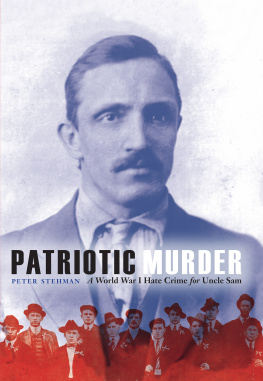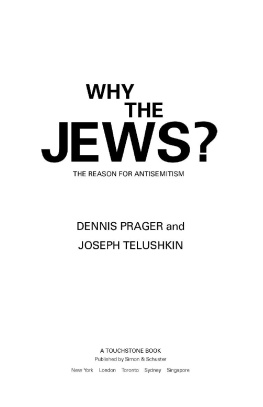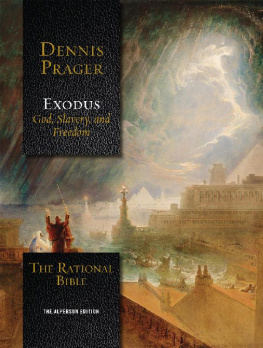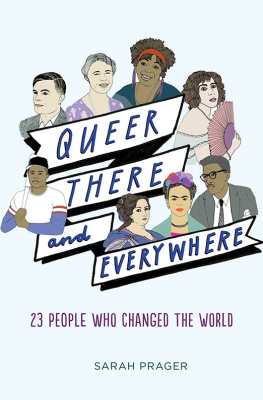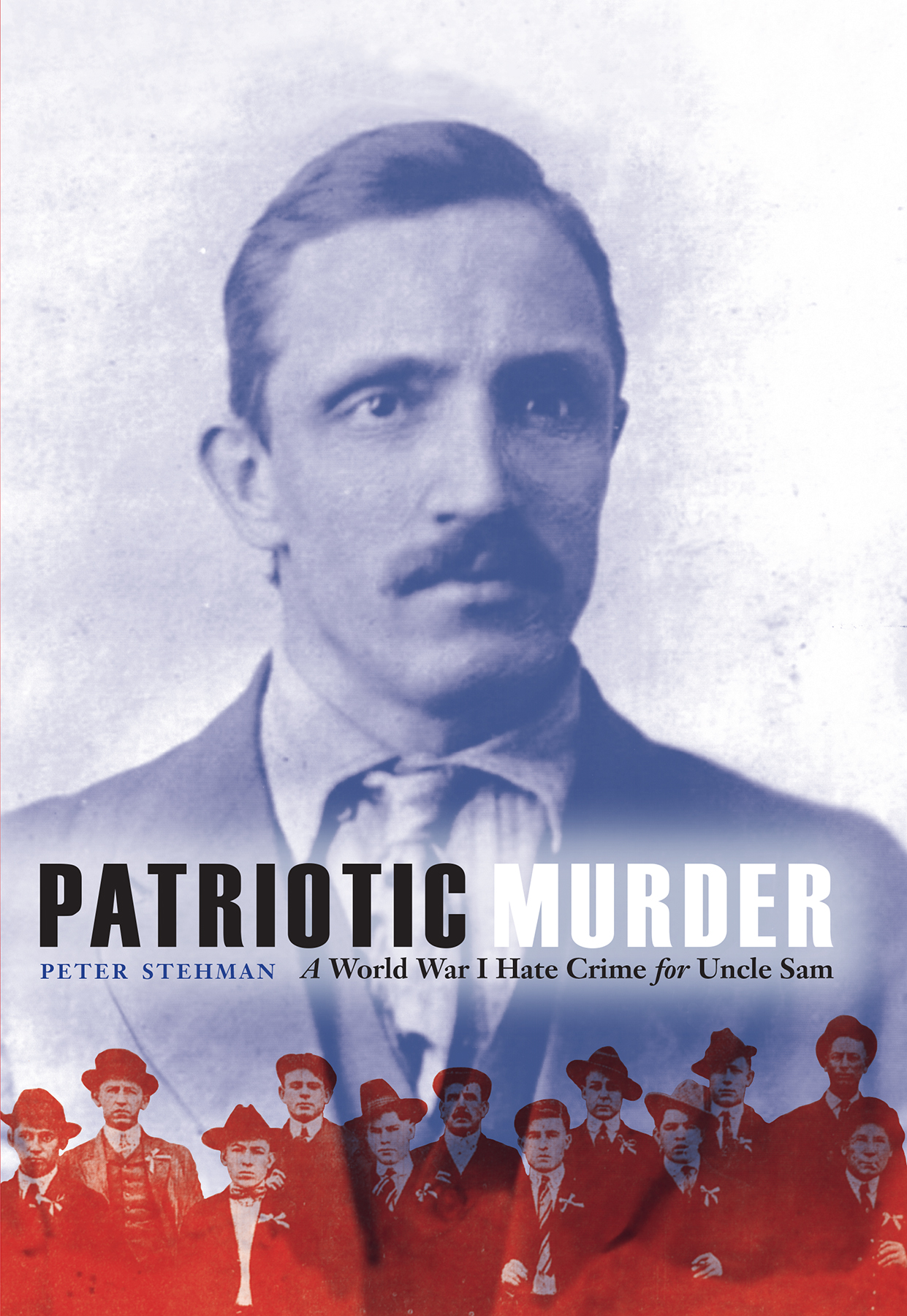An undertone of cold fury pulses through Peter Stehmans meticulously researched account of Robert Pragers lynching by an Illinois mob in 1918 and the subsequent trial that let his murderers off scot-free. The tale he tells is by turns touching, troubling, and timely. It amounts to a parable about the ease with which inflamed patriotism and ignorant prejudice can brew a toxic storm that exposes the frailty of our humanity as well as the fallibility of our judicial system.
David M. Kennedy, Pulitzer Prizewinning author of Over Here: The First World War and American Society
Patriotic Murder
A World War I Hate Crime for Uncle Sam
Peter Stehman
Potomac Books | An imprint of the University of Nebraska Press
2018 by Peter Stehman
Cover designed by University of Nebraska Press; cover images are from the interior.
All rights reserved. Potomac Books is an imprint of the University of Nebraska Press.
Library of Congress Cataloging-in-Publication Data
Names: Stehman, Peter, author.
Title: Patriotic murder: a World War I hate crime for Uncle Sam / Peter Stehman.
Description: [Lincoln, Neb.]: Potomac Books, An imprint of the University of Nebraska Press, [2018] | Includes bibliographical references and index.
Identifiers: LCCN 2017053879
ISBN 9781612349848 (cloth: alk. paper)
ISBN 9781640120983 (epub)
ISBN 9781640120990 (mobi)
ISBN 9781640121003 (pdf)
Subjects: LCSH : Prager, Robert, 18881918. | GermansIllinoisCollinsville. | LynchingIllinoisCollinsville. | Collinsville (Ill.)History. | Coal mines and miningIllinoisCollinsville. | World War, 19141918Social aspectsUnited States.
Classification: LCC F 549. C 725 S 74 2018 | DDC 977.3/86dc23
LC record available at https://lccn.loc.gov/2017053879
The publisher does not have any control over and does not assume any responsibility for author or third-party websites or their content.
This work is dedicated to my parents, Lucille and Milton Stehman, who taught their children to learn and respect local and U.S. history, to stay well-informed about public affairs, and to serve the community and nation in which they live. Never have those attributes been more necessary than today.
Contents
Since I was first told of the incident as child, I have always held a certain fascination for the story of the lynching of Robert Prager. I was probably drawn by the macabre sense that something that wicked, that sensational, had actually occurred in my hometown, where nothing ever really seemed to happen. To make it all the more mysterious, there seemed little to document the eventno memorials or books, just the story as related by my parents. They were too young to have witnessed the lynching, but they dutifully passed on what they had been told by my grandparents and others. But why was Collinsville the only place where a German immigrant was lynched during World War I? What were the ingredients that had cooked up so much trouble here?
For generations the lynching wasnt openly discussed in Collinsville, initially because those most deeply involved probably didnt want it brought up. It was kept tucked away by later generations, who felt no need to discuss something that may have shamed their families and certainly shamed the community. That the whole affair seemed Collinsvilles open secret only increased my intrigue.
It was never a question of if I would write on the Prager lynching but simply a matter of when. I had two primary goals for the project. The first was to tell the complete story, including a description of the turbulent environment that allowed it to happen in Collinsville. The second was to provide the most accurate account of what actually occurred, an effort that would also require extensive research.
There are many people I wish to thank for their assistance, whether it was a tip on a possible resource, answering some obscure question, providing technical advice, reading portions of the manuscript, or just providing overall support. My thanks to all of you for helping me tell this important story: Harper Barnes, Mike Bartsch, Charles Bosworth, Delores Cox, Francis Jo (Bruno) Elkins, translator Carmen Freeman, Patrick Gauen, Loretta Giacoletto, Steve Giacoletto, Annette Graebe, Paul Guse, Philip Herr, Robert Herr, Wayne Hinton, David and Marian Hoskin, Louis Jackstadt (rest in peace, Lou), Robert Johann, William Jokerst, Phyllis (Riegel) Kesler, Judy (Mueller) Kramer, Rev. Dr. Martin Lohrmann, Jeffrey Manuel of Southern Illinois UniversityEdwardsville Historical Studies, Randy Mitchell, Kay Monroe, Madison County coroner Steve Nonn, Madison County Trial Court administrator Teri Picchioldi, Hon. Philip Rarick, Mary Sue Schusky, Paige St. John, and Hon. Don Weber. If there are others whom I have neglected to individually mention, please accept my apology and also my gratitude.
In order to best reconstruct what happened in 1917 and 1918 Collinsville, I extensively relied on local and St. Louisarea newspapers. Most of these were found in St. Louisarea libraries on microfilm. Likewise regional and state archives broadened my knowledge of the regional wartime environment and provided further details from the Prager case. I was fortunate to have excellent library and archive facilities for my research. I naturally spent a significant amount of time at the Collinsville Memorial Library Center, and I appreciate the assistance from Leslee Hamilton and other staff members there. The Collinsville Historical Museum was an important resource, and I am grateful to Charlotte Knapp and the museums other volunteers. I also appreciate the efforts of Mary Westerhold and others at the Madison County Historical Museum and Archival Library in Edwardsville. The St. Louis Central Public Library is truly a gem of the Gateway City, and I would like to thank staff members there too for their invaluable assistance. I extend that same thanks to the staffs of the public libraries in Belleville and Edwardsville.
Both the Illinois State Library and the Illinois State Archives in Springfield were more than helpful, as was the staff of the Abraham Lincoln Presidential Library in the same city. I gained valuable information at the Thomas Jefferson Library at the University of MissouriSt. Louis, as I did at the (Elijah) Lovejoy Library on the campus of Southern Illinois UniversityEdwardsville. Stephen Kerber was most helpful at SIUE s Louisa H. Bowen University Archives and Special Collections. I appreciate the individual efforts of Lesley Martin at the Chicago History Museum, Shawn Barnett at Concordia Historical Institute in St. Louis, and Tilo Bnicke of the State Archives in Dresden. I was also assisted in my research with information provided by the Missouri History Museum Library and Research Center in St. Louis and the Indiana State Archives in Indianapolis.
Words cannot express my thanks for my friend Brad Bugger and my brother, Jim Stehman, for their review of and commentary on the complete manuscript. Their critical insights and overall observations helped me to tell the story better, in a manner that allows readers to find their way more easily through all the permutations.

